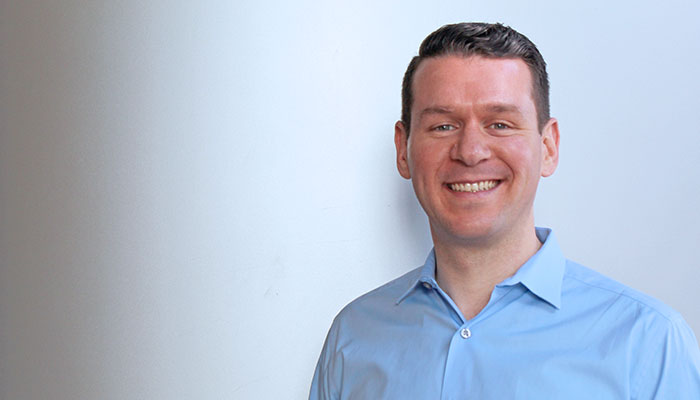HOW CAN WE HELP YOU? Call 1-800-TRY-CHOP
In This Section
'Diversity is the Foundation of Our Team': Q&A With Joseph Zackular, PhD

Joseph Zackular, PhD, studies how microbes interact to both help and harm.
Editor's Note: Welcome to our monthly Faculty Spotlight series, in which we sit down with faculty members at Children's Hospital of Philadelphia Research Institute to learn more about their research and roles. Through these spotlights, our readers meet the diverse, dedicated, and distinctive individuals who lead our research community in our mission to improve children's health. It's a new round of spotlights, and this time, we'll be asking our featured scientists about how they encourage diversity, equity, and inclusion within their labs. In this Q&A, we meet Joseph Zackular, PhD, investigator in the Department of Pathology and Laboratory Medicine. Stay tuned for more from our Faculty Spotlight series throughout this year!
How long have you been at CHOP?
I have been at CHOP since August of 2018. The four-year birthday for the Zackular Lab just passed — time has really been flying by!
Can you tell us a little about your research specialty?
Our research focuses on the important nosocomial pathogen, Clostridioides difficile (C. diff). C. diff is a major healthcare-associated pathogen that is closely linked to antibiotic treatment. When you take antibiotics to treat an infection, those antibiotics can cause collateral damage to your beneficial microbes. These important microbes, the microbiota, live within us and on us, and protect us from invading pathogens. When disturbed, our microbiota loses the important ability to outcompete and restrict pathogen colonization.
The crux of my lab’s research is focused on understanding how these microbes interact with C. diff and impact susceptibility to and severity of infection. We are specifically interested in understanding the molecular mechanisms by which the microbiota both antagonizes or potentially supports C. diff in the gut across the age continuum, so we are studying these complex interactions in infants, children, adults, and the elderly. We hope to use what we learn from this work to develop diagnostics, vaccines, and novel therapeutic strategies to treat C. diff infection.
Why did you choose this specialty focus?
I have always been fascinated by microbial communities and ecology. The way that microbes interact with one another and their environment is complex and incredibly interesting. It becomes even more fun when you begin to consider the myriad ways the microbiota can influence the host as well. This complexity is what intrigues me, and we spend a lot of time trying to understand how all of these variables impact human health.
Please tell us about a current or recent research project that excites you.
There are a wide array of fun projects going on in our lab. One project that is quite exciting is focused on understanding how C. diff cooperates with other pathogenic microbes in the gut during infection. A super talented graduate student at the University of Pennsylvania, Alex Smith, has led this highly collaborative effort. In short, Alex has discovered that a group of antibiotic-resistant organisms in the microbiota, the enterococci, reshape the environment in the gut to better support C. diff fitness and enhance virulence.
We have evidence that enterococci directly feed nutrients to C. diff that allow it to thrive in the gut. The enterococci then take advantage of the damage caused by C. diff during infection to acquire nutrients and, in turn, perpetuate this mutually beneficial relationship. We think this work has broad clinical relevance for our understanding of this important infection and improves our fundamental understanding of this complex nosocomial pathogen.
What long-term research questions do you hope to answer?
The long-term goal of our research is to better understand the factors that shape the outcomes of gastrointestinal infections. We are working hard to apply the lessons learned in our research to develop therapeutics and diagnostics to better help patients.
How do you support diversity, equity, and inclusion among your research team?
All of my early successes have been driven solely by the incredible and diverse team that I am lucky to be able to work with each day. Lab culture and diversity is the foundation of our team and creating and maintaining a variety of ideas, backgrounds, cultures, genders, and sexual orientation are all key to our success. We spend a lot of time fostering an open and accepting lab environment and actively communicating.
Culture and diversity are the first things that I discuss with prospective trainees who are eager to join the lab — we want buy-in from everyone on the team. We not only want to recruit a diverse group of team members, but we focus on actively supporting this diversity on a day-to-day basis. We encourage communication among everyone in the lab, and we work to create a space where everyone is comfortable speaking their mind. We strive to always be auditing ourselves and self-reflecting on diversity, equity, and inclusion within our own lab and among the broader community at CHOP.


